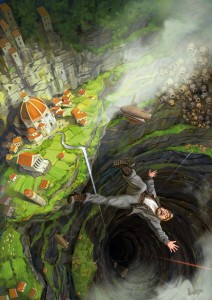

So now I’ve worked my way through BEST SERVED COLD and am on the third volume of the First Law trilogy, which starts with THE BLADE ITSELF (and I can tell I’m going back to read both of the first two, in order to see better how they fit with the First Law trilogy). I’ve got to say, gee whiz, when Delany is talking about how you can only write stuff as good as the best stuff you’re reading, this is the sort of thing he’s talking about, because I know I’ve learned a good bit about the subject matter mentioned in the title from looking to see how Abercrombie does it.
...

Not cover to cover, as you would a novel. Rather I pick them up, flip through the pages, pause to dip into them in search of new words to file away mentally. I relish new words so I’m always looking for them, especially sinewy and interesting new verbs, or nouns crusted with bits of morphological history.
I know I’m not alone in this — it’s a disease that many (though certainly not all, or even most, I think) writers (and some non-writers) share, and it’s not one its sufferers talk about much, because Good LORD how boring is that, reading the dictionary?
I have an American Heritage I’ll never part with, and beyond that the beloved Compact OED, three volumes and accompanying magnifying glass, that my brother Lowell got for me while I was in grad school and which will be with me till my dying days, I firmly well. And specialized dictionaries: a Penguin Dictionary of Symbols, a dictionary of foreign terms, another of fashion terms, and a glut of foreign language dictionaries, Russian, Hawaiian, Navaho, jostle for space on one on my most visited bookshelves.
...

In the course of one workshop the topic of writing about rape came up and Jim C. Hines has provided a timely article about it in the most recent Apex Magazine. In brief, Don’t use rape as 1) easy motivation for a character or 2) shorthand for how bad someone is and do some research about things like the mental aftereffects if you’re going to write about it.
If you want to read a piece that does it well (and harrowingly), I would suggest The Sparrow by Maria Doria Russell. I also mentioned Susan Griffin’s Woman and Nature: The Roaring Inside Her.
Also mentioned last week as a great book for looking at sentence and paragraph level writing:
Style: Ten Lessons in Clarity and Grace
...
It’s the time of year when people are contemplating submissions to workshops like Clarion, Clarion West, Odyssey, Taos Toolbox, and a myriad of others. Here’s seven tips to help with yours.
Enjoy this writing advice and want more like it? Check out the classes Cat gives via the Rambo Academy for Wayward Writers, which offers both on-demand and live online writing classes for fantasy and science fiction writers from Cat and other authors, including Ann Leckie, Seanan McGuire, Fran Wilde and other talents! All classes include three free slots.
Prefer to opt for weekly interaction, advice, opportunities to ask questions, and access to the Chez Rambo Discord community and critique group? Check out Cat’s Patreon. Or sample her writing here.
...
Had a short short story, aka flash, appear this morning and shape itself while en route to coffee. Just finished writing it out, although the last line needs a lot of sharpening. Huzzah for starting the day with a new story, though! I think one reason for recent productivity is the reading and thinking about short stories involved in teaching the short story class.
And here’s a teaser from the short story I’m finishing up today. It’s a secondary world S&S piece, with a working title of “Love’s Footsteps”.
At the time he did it, Moulder found the idea of removing his heart, applying a calcifying solution, and storing it in a safe place, all in the name of immortality, quite reasonable. He performed the ritual in the diminutive but ominous tower he had built in one corner of his parents’ estate, watched over by dour-jawed examples of taxidermy, crocodiles and glassy-eyes owls, assisted by his faithful servant, Small. She held out the iron receptacle to hold his heart, her face impassive and unjudgmental, and afterwards laved his hands with cold water and wiped them dry.
...

Kurt Vonnegut, Jr. – Vonnegut is the best of the best, and I don’t just say that because he’s a fellow Hoosier. Welcome to the Monkey House is a great collection to start with and one that I read over and over in high school, but I’m also fond of Look At the Birdie, published posthumously.
Carol Emshwiller – Also amazing, also doing things so skillfully that plain language manages to become part of such a lovely construction that the grain of the words seems ornamental as well as story material. I just love Emshwiller, and getting to publish one of her short stories during my time at Fantasy Magazine was a highlight. I particularly recommend I Live With You and Report to The Men’s Club.
...
I’ve got the okay to announce this, so here you are: I’ve got a story in the upcoming Fathomless Abyss anthology and I’ll be putting out a longer work set there next year. It’s a very cool project, and I’m pleased to be part of it, along with Philip Athans, Jay Lake, J. M. McDermott, Mel Odom, Mike Resnick, and Brad Torgersen. My story’s called “A Querulous Flute of Bone,” and it’s a riff on a favorite O. Henry piece, “The Pimenta Pancakes,” from The Heart of the West.
Here’s the cover for the anthology, which will be available early next month:

...
This was a really useful article. Some highlights:
“Every writing session after this realization, I dedicated five minutes (sometimes more, never less) and wrote out a quick description of what I was going to write. Sometimes it wasn’t even a paragraph, just a list of this happens then this then this. This simple change, these five stupid minutes, boosted my wordcount enormously. I went from writing 2k a day to writing 5k a day within a week…”
“…my productivity was at its highest when I was in a place other than my home. That is to say, a place without internet. The afternoons I wrote at the coffee shop with no wireless were twice as productive as the mornings I wrote at home. I also saw that, while butt in chair time is the root of all writing, not all butt in chair time is equal.”
“Those days I broke 10k were the days I was writing scenes I’d been dying to write since I planned the book. They were the candy bar scenes, the scenes I wrote all that other stuff to get to. By contrast, my slow days (days where I was struggling to break 5k) corresponded to the scenes I wasn’t that crazy about.”
I’m going to try to do more coffee shop writing in the next couple of weeks as well as put more time into planning (I just outlined the story I want to write today, for example, scene by scene) and see what effect it has.
Pretentious Title: How I Went From Writing 2,000 Words a Day to 10,000 Words a Day
 How I Went From Writing 2000 Words a Day to 10000 Words a Day. When I started writing The Spirit War (Eli novel #4), I had a bit of a problem. I had a brand new baby and my life (like every new mother…
How I Went From Writing 2000 Words a Day to 10000 Words a Day. When I started writing The Spirit War (Eli novel #4), I had a bit of a problem. I had a brand new baby and my life (like every new mother…
Enjoy this writing advice and want more like it? Check out the classes Cat gives via the Rambo Academy for Wayward Writers, which offers both on-demand and live online writing classes for fantasy and science fiction writers from Cat and other authors, including Ann Leckie, Seanan McGuire, Fran Wilde and other talents! All classes include three free slots.
Perefer to opt for weekly interaction, advice, opportunities to ask questions, and access to the Chez Rambo Discord community and critique group? Check out Cat’s Patreon. Or sample her writing here.
...

It’s to the point because everyone’s process differs, and may change due to time and circumstance. I can write with some ambient noise, for example, so I can take a notebook over to Soul Food Books in order to grab coffee and one of their tables and know I’ll have a productive afternoon. Here at home, I need more quiet, and it takes me a little longer to get focused, but once I’m started I can write fast and furiously for a stint that’s good for a chunk of words. I like writing in airports, but it’s scattered writing, flashes of notes, observations about people, notes for stories I’ll write later.
Sometimes I write on the computer, other times by hand in a notebook. I’ve tried dictating and at first it didn’t work well for me but over the course of a decade has become crucial to my process. I sample different notebooks – I like big artist’s sketch pads to write in, actually, because I like all that white space with plenty of room for extra notes and diagrams. I don’t like writing on small surfaces, like business cards or Post-its; I don’t think I’d get much done if forced to rely on those.
And actually, I take that back. If all I had to write on was index cards, I’d make that work. Because sometimes you have to, or else give up on writing. A new parent, for example, won’t have the uninterrupted bouts of time that they once had. They have to start thinking about writing in short bursts, or at a time they’d normally be in bed. The trick is to write, to resist the temptation to slack off, to give yourself a break.
Try new things. Go write somewhere today where you haven’t written before and turn out a few hundred words there: sitting on your front steps, or on an aquarium bench while tourists pass, or sitting on the back of one of the lion statues outside the Art Institute in Chicago while a November wind gnaws at your fingers. Or write a list of ten places to try – and then try at least one. Or stay at home in your usual place, that’s fine too. As long as you’re getting some writing done.
The mantra of our household is: writers just effing write. Because it’s so much easier not to do it, to spend time reading blog posts or alphabetizing the spice rack or making plans and blueprints for the wonderful story we’ll produce, once we get sufficiently prepared. Prepare yourself for the writing, don’t prepare the writing for you by fiddling with outlines or research or format.
Enjoy this writing advice and want more like it? Check out the classes Cat gives via the Rambo Academy for Wayward Writers, which offers both on-demand and live online writing classes for fantasy and science fiction writers from Cat and other authors, including Ann Leckie, Seanan McGuire, Fran Wilde and other talents! All classes include three free slots.
Perefer to opt for weekly interaction, advice, opportunities to ask questions, and access to the Chez Rambo Discord community and critique group? Check out Cat’s Patreon. Or sample her writing here.
...

P.S. Want to read some flash fiction being written before anyone knew to call it that? Try James Thurber’s Fables for Our Time. Or for something more contemporary, Michael Swanwick’s Cigar-Box Faust and Other Miniatures.
Enjoy these story prompts and want more content like this? Check out the classes Cat gives via the Rambo Academy for Wayward Writers, which offers both on-demand and live online writing classes for fantasy and science fiction writers from Cat and other authors, including Ann Leckie, Seanan McGuire, Fran Wilde and other talents! All classes include three free slots.
Prefer to opt for weekly interaction, advice, opportunities to ask questions, and access to the Chez Rambo Discord community and critique group? Check out Cat’s Patreon. Or sample her writing here.
...
Want access to a lively community of writers and readers, free writing classes, co-working sessions, special speakers, weekly writing games, random pictures and MORE for as little as $2? Check out Cat’s Patreon campaign.

"(On the writing F&SF workshop) Wanted to crow and say thanks: the first story I wrote after taking your class was my very first sale. Coincidence? nah….thanks so much."

(Written with Ben Burgis, fantasy story) They said the Marielitas were escoria – scum. The abuelitas muttered it to each other, and the young girls coming home from school clustered together like butterflies, looking thrilled and worried whenever the wind whistled at them. The newspapers said Miami was under siege, that Castro had loosed the worst from the Cuban prisons and madhouses.


This site is protected by reCAPTCHA and the Google Privacy Policy and Terms of Service apply. This site is a participant in the Amazon Services LLC Associates Program, an affiliate advertising program designed to provide a means for sites to earn advertising fees by advertising and linking to Amazon.com.